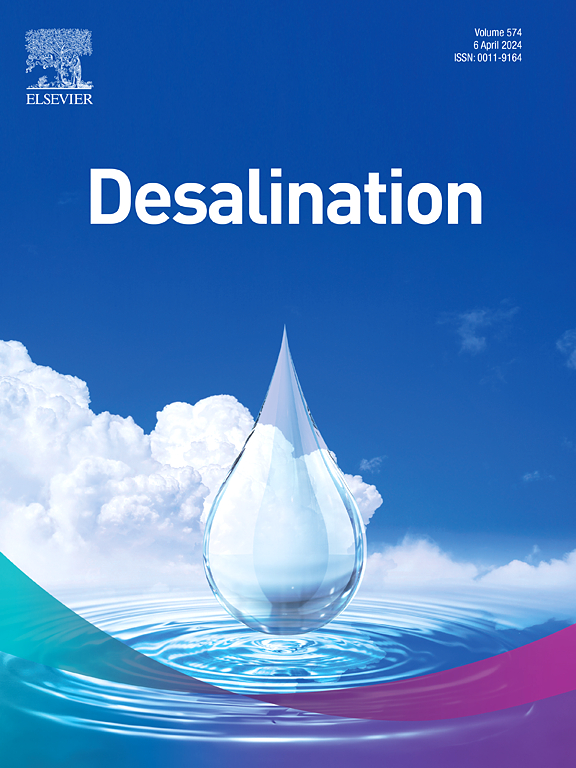Stacked solar distiller using water to storage heat for high-temperature evaporation
IF 8.3
1区 工程技术
Q1 ENGINEERING, CHEMICAL
引用次数: 0
Abstract
Solar stills can produce freshwater with low or even no carbonization to alleviate the problem of freshwater resource scarcity. However solar distiller's operation period is limited by the intermittence of solar energy, and the Gained-output ratio (GOR) is determined by operation temperature. To further develop efficient solar distillers, this paper investigates a stacked solar distiller with high evaporation temperature, utilizing water to storage heat. A mathematical model of a triple-stacked solar distiller (TSD) was established to describe the internal heat and mass transfer processes. Then an experimental device was built. The experiments under steady-heating and outdoor solar-heating have been conducted. The steady-heating testing results show that, when the evaporation temperature of TSD reaches 79.9 °C, the GOR reaches 2.00. The theoretical model can accurately predict the operating parameters of the distiller, with the deviation of the theoretical temperature from the experimental value within 0.9 °C and the GOR deviation ranging from 2.2 % to 21.0 %, under steady-heating testing. The outdoor testing results show that, at an average daily irradiance of 606 W/m2, the maximum evaporation temperature is above 90.0 °C, achieving a water yield rate of 2.53 kg/(h·m2) and the maximum instant GOR of system closing to 2.23. Combined with nighttime water yield attributing to heating storage, a water yield of 28.00 kg/(d·m2) can be achieved. This research may provide a good scheme for the scenario of small-scale distributed solar desalination demands.
堆叠式太阳能蒸馏器,利用水储存热量进行高温蒸发
太阳能蒸馏器可以生产低碳化甚至不碳化的淡水,以缓解淡水资源短缺的问题。但太阳能蒸馏器的运行周期受太阳能间歇性的限制,其获得输出比(GOR)受运行温度的影响。为了进一步发展高效太阳能蒸馏器,本文研究了一种利用水蓄热的高蒸发温度层叠式太阳能蒸馏器。建立了三叠太阳能蒸馏器(TSD)内部传热传质过程的数学模型。然后建立了一个实验装置。进行了稳态加热和室外太阳能加热实验。稳态加热试验结果表明,当TSD蒸发温度达到79.9℃时,GOR达到2.00。理论模型能准确预测蒸馏器的运行参数,在定温试验条件下,理论温度与实验温度的偏差在0.9℃以内,GOR偏差在2.2% ~ 21.0%之间。室外试验结果表明,在日平均辐照度为606 W/m2时,最高蒸发温度在90.0℃以上,系统的出水量为2.53 kg/(h·m2),最大瞬时GOR接近2.23。结合蓄热的夜间产水量,可实现28.00 kg/(d·m2)的产水量。本研究为小规模分布式太阳能海水淡化需求的场景提供了一个很好的方案。
本文章由计算机程序翻译,如有差异,请以英文原文为准。
求助全文
约1分钟内获得全文
求助全文
来源期刊

Desalination
工程技术-工程:化工
CiteScore
14.60
自引率
20.20%
发文量
619
审稿时长
41 days
期刊介绍:
Desalination is a scholarly journal that focuses on the field of desalination materials, processes, and associated technologies. It encompasses a wide range of disciplines and aims to publish exceptional papers in this area.
The journal invites submissions that explicitly revolve around water desalting and its applications to various sources such as seawater, groundwater, and wastewater. It particularly encourages research on diverse desalination methods including thermal, membrane, sorption, and hybrid processes.
By providing a platform for innovative studies, Desalination aims to advance the understanding and development of desalination technologies, promoting sustainable solutions for water scarcity challenges.
 求助内容:
求助内容: 应助结果提醒方式:
应助结果提醒方式:


